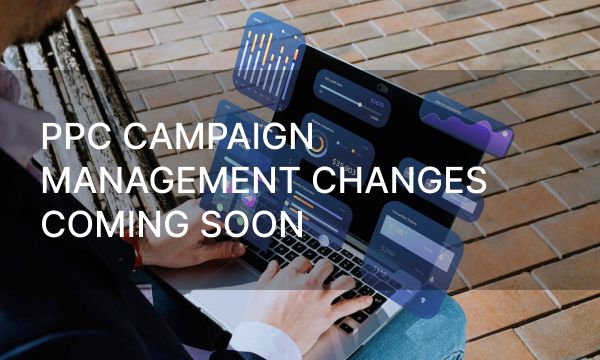 Briefly about the upcoming PPC campaign management changes and their importance.
Briefly about the upcoming PPC campaign management changes and their importance.
The ever-evolving world of PPC advertising requires marketers and advertisers to stay informed about the latest changes and trends in PPC campaign management. PPC advertising is an essential part of online marketing strategies for all businesses. So it’s to be expected that PPC campaign management automation, key changes and updates will shape the landscape in the nearest future.
A series of substantial changes will likely have a profound impact on the way campaigns are managed and executed. All of them are specifically designed to boost campaign performance and yield even more impressive results for advertisers. With these upcoming developments on the horizon, advertisers can look forward to a host of improvements in various aspects of their campaigns.
From advances in targeting and personalization to the integration of artificial intelligence and automation, understanding these developments will help maximize the effectiveness and success of your PPC campaigns. No matter if you’re new to PPC or a professional, this article will give you valuable insights to optimize your advertising campaigns and drive better results. So, let’s take a look at the upcoming changes and opportunities that await us in PPC campaign management.
What Is PPC Campaign Management
Marketers are often referred to as PPC managers because most of their time is spent on campaign management. Your ultimate goal is to achieve the optimal ROI from your campaigns. That’s why it’s important to choose phrases or keywords that the site will be associated with when people run searches.
PPC campaign management refers to the process of monitoring and optimizing paid advertising campaigns across Google Ads, Facebook Ads, and other digital ad networks. It aims to get the most out of your PPC campaigns, by making sure they are set up correctly, optimizing them effectively, and adjusting your campaigns as needed. It involves keyword research, ad creation, bid management, tracking conversions, and analyzing performance metrics.
The scope of PPC management includes:
- Account and campaign performance monitoring for unexpected changes
- Bid adjustments to optimize spending
- Budget controls for further cost management
- Checking the performance of keywords and pausing or excluding ineffective ones
- Exploring new keyword opportunities for future ads
- Reviewing ad copy and making some changes
- A/B testing of new versions of the ad copy
- Adjusting targeting settings like geolocation, device type, time, etc
- Measuring landing page performance, ad relevance and CTR
PPC campaign management is a crucial aspect of any digital marketing strategy. It covers planning, creating and optimizing online advertising campaigns, followed by analysis of results to maximize your ROI. This ensures that businesses reach their target audience efficiently, driving traffic and conversions.
Benefits of PPC campaign management:
- Saving money by monitoring performance to determine which ads are effective and which are not.
- Increasing ROAS, which is the profit you earn on your ads.
- Driving business growth by using valuable targeting keywords, optimizing bidding strategies, and analyzing competitors’ ads.
PPC Campaign Management Automation
 Photo by Possessed Photography on Unsplash
Photo by Possessed Photography on Unsplash
It’s impossible to keep track of every change in your Google Ads account. That is why automated control becomes not just an advantage, but a necessity. With the power of machine learning and automation, you can devote all your time to important tasks instead of wasting hours on tedious low priority tasks.
While automation isn’t new in PPC campaign management, it will only grow in importance. Various platforms such as Google Ads and Microsoft Advertising have made it possible for marketers to automate different aspects of campaigns and focus on strategy. Artificial intelligence simplifies bidding, ad creation and campaign management.
Automation is most useful when it comes to campaign monitoring. Smart algorithms constantly analyze performance data, adjust bids in real time, and optimize your ads for maximum conversions. With automation, you can focus on creating captivating ad copy and creative strategies that will really resonate with your audience.
Smart Campaigns are now the default setup when making a new Google Ads campaign. They automate bidding and some targeting options. AI-powered automatic bidding strategies optimize your bids in real time, helping you get the most out of your investment. Once you set a goal, Smart Bidding automatically optimizes your bids for the best possible results.
Dynamic search ads allow you to run several different ad titles and descriptions at once. Google Ads then mixes and matches the multiple components to find the best combinations for each audience segment. This is an automated method for finding the best ad messages.
Using AI can take your PPC campaigns to new heights. These smart algorithms can analyze huge amounts of data and discover patterns that PPC managers might miss. Using AI-powered ad optimization tools allows you to create ads that are specifically targeted to your audience, increasing your chances of converting.
Upcoming PPC Campaign Management Changes
 Photo by Google DeepMind on Unsplash
Photo by Google DeepMind on Unsplash
There are several significant changes happening in PPC campaign management. One of the notable changes is the growing focus on audience targeting and personalization. As consumer expectations keep increasing, targeting ads to specific audiences based on demographics, interests, and online behavior will be crucial for driving better results.
A greater emphasis on privacy regulations that affect targeting capabilities is also anticipated. Since data privacy concerns have become more urgent worldwide, platforms may implement tighter restrictions on how advertisers collect and utilize user data for targeting purposes. Advances in machine learning algorithms are leading to more complex methods of automating PPC campaign management. Auto-bidding strategies are also expected to be improved to take into account real-time data signals and conversion predictions for optimal campaign performance.
AI-powered tools are becoming more sophisticated, providing valuable insights and automation capabilities. They analyze huge amounts of data, identify patterns, and make data-driven decisions in real-time. This way, marketers can optimize their PPC campaigns more effectively and improve targeting, ad relevance, bidding strategies, and overall performance.
Having explored the new technologies that have revolutionized PPC campaign management, it’s time to dive deeper into practical strategies to help marketers leverage them and maximize the effectiveness of their campaigns. When implementing AI into a PPC campaign, the key is to choose the right AI-powered tools that match specific goals and objectives. AI-powered tools can save you precious time and improve the performance of many campaign management processes.
To make the most of machine learning algorithms, it’s important to regularly monitor and analyze campaign performance data. You can make data-driven decisions to adjust bidding strategies, specify keywords, and optimize ad creative elements accordingly. Optimization of PPC campaigns for voice search is essential in today’s digital landscape.
Including conversational language and long keywords that reflect the way people speak will increase the likelihood of your ads appearing in relevant voice search results. Given the context and purpose of voice queries, you can deliver more tailored and personalized ads to your target audience. This way you can harness the power of new technologies in PPC campaign management and gain a competitive edge in the ever-evolving digital advertising.
Opportunities inside PPC campaign management changes
More Personalized and Targeted Ads
Understanding consumer behavior is now more important than ever to effectively manage a PPC campaign. User behavior patterns and preferences help businesses create highly personalized ads that match customer needs, while improving conversion rates. To define and reach target audience segments with laser precision, demographic, behavioral and contextual data must be used to ensure ads reach the right people at the right time.
Voice Search
Since the advent of voice-enabled devices such as smart speakers and voice assistants, voice search has become popular. PPC advertisers are now adapting their campaigns specifically for voice search. This includes optimizing keywords, ad formats, and matching content to the conversational nature of voice search. Advertisers should use more colloquial language and long-tail keywords that match how people speak rather than type.
Visual Search and Shopping
Visual search and shopping advertising will be the next big step in 2023 and beyond. By using visual search platforms such as Google Lens and Pinterest, businesses enable consumers to search for products through images, creating entirely new advertising opportunities. YouTube and social media offer great opportunities to reach your audience through captivating video content. Integrating video ads into your PPC strategy can effectively grab attention and, as a result, boost conversions.
Ad Copy and Call-to-Action Optimization
Creating a compelling ad copy and powerful call-to-action statements remains a critical aspect of PPC campaign management. It’s time for advertisers to focus on creating attractive ad copies that communicate a unique value proposition, and drive users to take action. Optimizing call-to-action statements for maximum impact can significantly increase the success of PPC campaigns.
Dynamic Remarketing
Dynamic remarketing drives personalization in PPC campaigns to a higher level. By showing users the ads for previously viewed products or services, advertisers can bring back potential customers and encourage them to make a purchase. Dynamic remarketing has proven to be an effective strategy for improving conversion rates and ROI.
Location-based Targeting
Location-based targeting is an essential element of effective PPC campaign management. Geolocation data allows advertisers to display ads tailored to a particular location or region. Geotargeting helps businesses reach potential customers at their hotspot to direct them to retail stores or local offices.
Conversion Tracking and ROI Analysis
Conversion tracking and ROI analyzes show you how profitable your PPC campaigns are. These tools should become an integral part of your PPC campaign management. By understanding which campaigns, keywords, and ads are generating the most valuable conversions, you can properly allocate your ad budget and maximize your ROI.
Privacy and Data Regulation Changes
With the development of new technologies, especially artificial intelligence, there is a lot of concern about privacy and data regulations. In these conditions, it is especially important to always be one step ahead and ensure compliance with evolving regulations. This is why adapting to changes in privacy and data regulation should be a high priority for PPC managers.
Conclusion
Limiting PPC campaigns to search engines is a thing of the past. New advertising platforms and channels are emerging all around, providing limitless opportunities to reach the target audience. From social media to voice search, you need to master all the innovative tools in order to tailor your PPC strategy accordingly.
PPC advertising is constantly evolving due to technological advances and revolutionary breakthroughs. PPC campaign management also continues to be updated, creating new challenges and endless opportunities for marketers. Powered by data analytics, AI, and automation, you can optimize your PPC campaigns for maximum impact and ROI.
Being prepared for the upcoming changes in PPC campaign management is essential for digital marketers to be able to compete. Using automation tools and tailoring strategies based on audience targeting and privacy rules will enable advertisers to get better results and maximize their PPC advertising investment. Greater awareness allows businesses to navigate these changes well and achieve their marketing goals.
